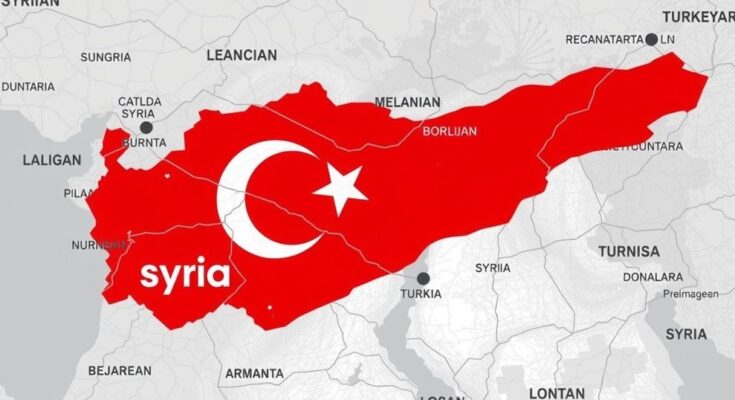The recent collapse of Bashar al-Assad’s regime in Syria has enabled Turkey to assert itself as a primary actor in the conflict. Following a rapid military operation by opposition groups, Turkey advocates for dialogue between Syrian factions, focusing on governance and refugee return initiatives. As Ankara prepares for possible reconstruction efforts, it faces challenges related to regional security and resource control from U.S.-backed forces. Turkey’s future role in Syria is pivotal for stabilizing the region and facilitating a transition post-Assad.
The swift collapse of Bashar al-Assad’s regime in Syria has altered the geopolitical landscape, enabling Turkey to emerge as a dominant player in the conflict. Turkish officials had anticipated Assad’s downfall, though the speed at which it occurred took many by surprise. Initially, Turkey allowed limited military operations by Syrian opposition forces, aligned with Hay’at Tahrir al-Sham (HTS), primarily to counter repeated attacks on civilians in Idlib, which resulted in a refugee influx towards Turkey’s borders. The geopolitical dynamics were favorable; while Russia engaged in Ukraine, and Iran focused on Israel, the U.S. transitioned leadership.
As a limited operation escalated rapidly into a comprehensive campaign, Turkey solidified its influence by capturing significant territories. Ankara has since advocated for dialogue between the Syrian government and opposition, urging the preservation of state institutions. HTS leader Abu Mohammad al-Jolani has maintained existing administrative frameworks while promoting inclusion of diverse sects, even making overtures to Russia to foster stability.
Khaled Khoja, former president of the National Coalition for Syrian Revolutionary and Opposition Forces, contended that Turkey’s involvement was crucial throughout the operation and credit was due to Turkish leadership for strategically navigating the complex Syrian conflict. Turkey has also endeavored to moderate HTS’s approach and has been instrumental in establishing governance structures in northern Syria, aimed at fostering reconciliation amongst the divided opposition groups.
According to regional experts, Turkey’s objectives in Syria revolve around enabling political unity and establishing an interim government to represent various factions. Turkey has experienced significant challenges due to its long-term support of the Syrian opposition, yet it possesses the capability to guide the future of a post-Assad Syria based on previous governance successes.
Experts caution that any transitional government will need to secure resources controlled by U.S.-backed groups, such as the Syrian Democratic Forces (SDF), particularly those in strategically vital areas. Additionally, Turkey remains focused on addressing the return of millions of Syrian refugees, many displaced from previously government-held areas, and an economic model supporting their reintegration is being promoted, albeit gradually, with various challenges lying ahead.
Ultimately, reconstruction will require extensive resources and collaborative efforts amongst regional actors. Turkey is poised to play a leading role in coordinating international assistance efforts and contributions from Gulf nations, as well as engaging with non-governmental organizations to facilitate humanitarian support and effective governance in the reconstructed Syria.
The Syrian civil war has created a complex humanitarian and political crisis impacting regional stability. Turkey’s strategic interests in northern Syria have led it to support Syrian opposition forces against the Assad regime. The recent rapid collapse of government control in key areas has provided Turkey with an opportunity to reshape the dynamics of the conflict, leveraging its military influence while addressing security concerns related to its borders and refugee populations. The balance of power has shifted, offering Turkey the chance to engage in reconstruction and transitional governance initiatives, fostering relations with both Syrian factions and external powers. As Turkey seeks to consolidate its role, careful navigation of relationships with Kurdish forces and the SDF, alongside humanitarian efforts, will be essential.
Turkey’s position in Syria has dramatically evolved with the recent shifts in control from the Assad regime to opposition factions. Its strategic operations have enabled Ankara to take a leading role not only in military engagements but also in future governance and reconstruction discussions. As Turkey prepares to aid in rebuilding war-torn Syria, it is crucial for the nation to manage the delicate balance of diverse political factions and international stakeholders while addressing the pressing issue of refugee returns and local resource control. The prospects for post-Assad Syria will largely depend on Turkey’s ability to sustain its influence while fostering a stable and inclusive governance framework.
Original Source: www.middleeasteye.net




